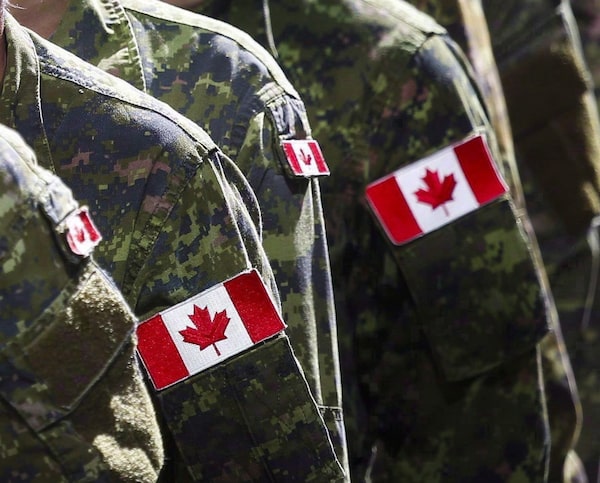
Members of the Canadian Armed Forces march during the Calgary Stampede parade in Calgary, Friday, July 8, 2016. Female service members and veterans are blasting the way Canada's military police investigate allegations of sexual assault and harassment in the ranks.Jeff McIntosh/The Canadian Press
Ottawa must urgently set up an independent mechanism for members of the Canadian Armed Forces to report allegations of misconduct, survivors of military sexual trauma and experts on the matter told a House of Commons committee on Tuesday.
The new oversight agency should report to Parliament rather than to military leaders, and provide services to support the victims, they said.
Lieutenant Heather Macdonald, who is in the Navy, told the Status of Women committee that most members of the armed forces who experience misconduct pay a greater price than perpetrators if they make a complaint.
“That is why most victims are reluctant to come forward,” she said. “We need to fix this, we need to make this a better, safer place for females to work.”
Advocates say victims of sexual trauma often do not feel they can get justice when vocalizing concerns through military channels. They say an external body that reports directly to Parliament would be independent from the Department of National Defence.
In a recent interview with Global News, Lt. MacDonald alleged she was the subject of sexual misconduct in 2010 by Art McDonald, an admiral who stepped away from his position as chief of the defense staff in February and is the subject of an investigation by military police. No formal findings have yet been made. Lieutenant-General Wayne Eyre has assumed the role of head of the military in the meantime and has acknowledged the CAF is at an “inflection point” on the issue of sexual misconduct.
Maya Eichler, an associate professor and Canada Research Chair at Halifax’s Mount Saint Vincent University, told the committee on Tuesday a systemic change in military culture is required to address the issue. Public and political engagement will also be needed, she added.
“Most importantly, it will require an oversight agency with a mandate to report to Parliament,” she said. “I see no other pathway to ensuring we are not here five years from now, having these same conversations again.”
In 2015, an external review by former Supreme Court justice Marie Deschamps noted that the only way to increase the frequency of reporting is to create a mechanism outside the chain of command. The report also said armed forces in countries such as the United States, Australia and France have independent offices to which sexual misconduct can be reported, and that provide victim support, conduct training for prevention, and track data.
Six years after the release of Ms. Deschamps’ report, sexual misconduct in the military and the reporting of it remain matters of concern. In Monday’s federal budget, the government indicated it plans to implement new external oversight mechanisms to bring greater independence to the processes for reporting sexual misconduct in the Canadian Forces.
The fiscal blueprint also included a pledge to enhance internal support services to victims, including access to free, independent legal advice and to ensure military members can access services without making a formal complaint. Ottawa is also piloting online and in-person peer support groups for Forces members and veterans who experienced sexual misconduct during their service.
At a news conference on Tuesday, Prime Minister Justin Trudeau said the Liberal government has taken “significant measures” over the past five years, but he acknowledged it has “become very clear that they are inadequate.”
“The culture change has not happened fast enough,” Mr. Trudeau said. “There are not yet the right supports for people who come forward with allegations and heart-wrenching stories of abuse and intimidation.”
The Liberal government has been under intense political pressure in recent weeks since former military ombudsman Gary Walbourne told a parliamentary committee he presented Defence Minister Harjit Sajjan with an allegation about then-chief of the defence staff Jonathan Vance in March, 2018.
Mr. Sajjan declined to see the evidence, but told his chief of staff, Zita Astravas, about the matter. Ms. Astravas informed Elder Marques, a senior adviser in the Prime Minister’s Office at the time, who brought in the Privy Council Office (PCO). The PCO was not able to obtain additional information from Mr. Walbourne, who said he did not have the complainant’s permission to share the evidence. Opposition parties have been seeking to have Mr. Marques testify at the House of Commons defence committee, but say the Liberals are trying to prevent it.
Conservative defence critic James Bezan said on Tuesday that his party is deeply disappointed by what he called the Liberal budget’s lack of real action on sexual misconduct in the Canadian Armed Forces.
“More than half the money promised is being shuffled from within the current defence budget and there is no promise of full independent oversight for sexual misconduct, especially at the highest ranks,” Mr. Bezan said. “This budget fails our women and men in uniform at the same time Minister Sajjan continues to cover up his failure to investigate sexual misconduct in the Canadian Armed Forces.”
NDP defence critic Randall Garrison called the commitments in the budget a step forward. But he said progress to stamp out sexual misconduct in the CAF will require the government to support and protect service women and men rather than senior commanders.
“Decisions to look the other way, protect and promote those at the top who have serious allegations of misconduct against them, actively contribute to the problem.”
Know what is happening in the halls of power with the day’s top political headlines and commentary as selected by Globe editors (subscribers only). Sign up today.